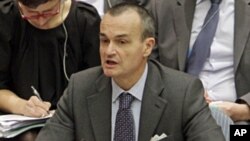European members of the U.N. Security Council have introduced a revised draft resolution condemning the repression in Syria, which they hope to bring to a vote in the council by the end of this week.
The Council has been very divided on the issue of uprisings in the Middle East. The U.N.’s most powerful body was silent on anti-government protests in Tunisia and Egypt and more recently in Bahrain, Yemen and Syria.
The only country it has pronounced loudly on is Libya, where Moammar Gadhafi threatened to go house-to-house to kill civilians who opposed him. In that case, the Security Council authorized military air strikes.
Earlier efforts in the council to respond to the Syrian protests failed to win consensus and were abandoned. Then in late May, the four European countries on the 15-member council - Britain, France, Germany and Portugal - circulated a draft text condemning the violence and calling for its immediate end.
But it quickly ran into problems with veto-wielding members Russia and China, who are always more reticent about interfering in what they see as internal state matters. Diplomats say non-permanent members Brazil, India, South Africa and Lebanon have also expressed concerns about the resolution.
After several rounds of discussions by the council’s political experts, the Europeans amended their original draft and brought it back to the council on Wednesday. British Ambassador Mark Lyall Grant told reporters some of what is in it:
“It demands an immediate end to the violence and condemns the systematic human rights abuses," said Lyall Grant. "It calls on the Syrian authorities immediately to lift the siege of affected towns; it calls for steps to address the legitimate aspirations of the Syrian people - which include reforms that would allow genuine political participation, inclusive dialogue, and the effective exercise of fundamental freedoms. And it calls upon all states to exercise vigilance and prevent the supply of arms to Syria.”
Ambassador Lyall Grant said the council would meet again Thursday to discuss the draft, adding he hoped there would be broad support for the measure and it could be put to a vote soon.
“We believe that the world should not stand silent in the face of the outrages that are happening and we hope that we will be able to move on the resolution in the coming days," he said.
French Ambassador Gérard Araud told reporters after the closed meeting that the escalation of violence over the last weeks has raised concerns Syria could slide into a civil war.
“The resolution that we have presented is simply sending a message - calling the Syrian authorities to choose the way of political dialogue; to call the Syrian authorities to stop the repression - because in anyway, what has happened in the last weeks has shown that this repression is totally unable to stop the protests of the Syrian people," said Araud.
Asked by reporters if Russia could support the newest draft, Ambassador Vitaly Churkin said Moscow could not. He said his government is not “persuaded it can help establish dialogue and reach a political settlement.” He added that Moscow is concerned it would have the opposite effect.
The United States has thrown its full support behind the draft resolution. Asked about the division within the council, Ambassador Susan Rice said it would become clear when there is a vote.
“I am most concerned that the United States of America express itself clearly and plainly," said Rice. "We will be on the right side of history as and when this comes to a vote. If others are unable to or unwilling to, then that will be their responsibility to bear.”
She said that several members used the example of Libya as “an excuse and as a ploy” to avoid the real issues involving Syria.
Rights groups say at least 1,100 people have been killed in the Syrian crackdown against the anti-government campaign that began in mid-March. More than 10,000 people have been arrested.
Europeans Push for Condemnation of Syria at UN




